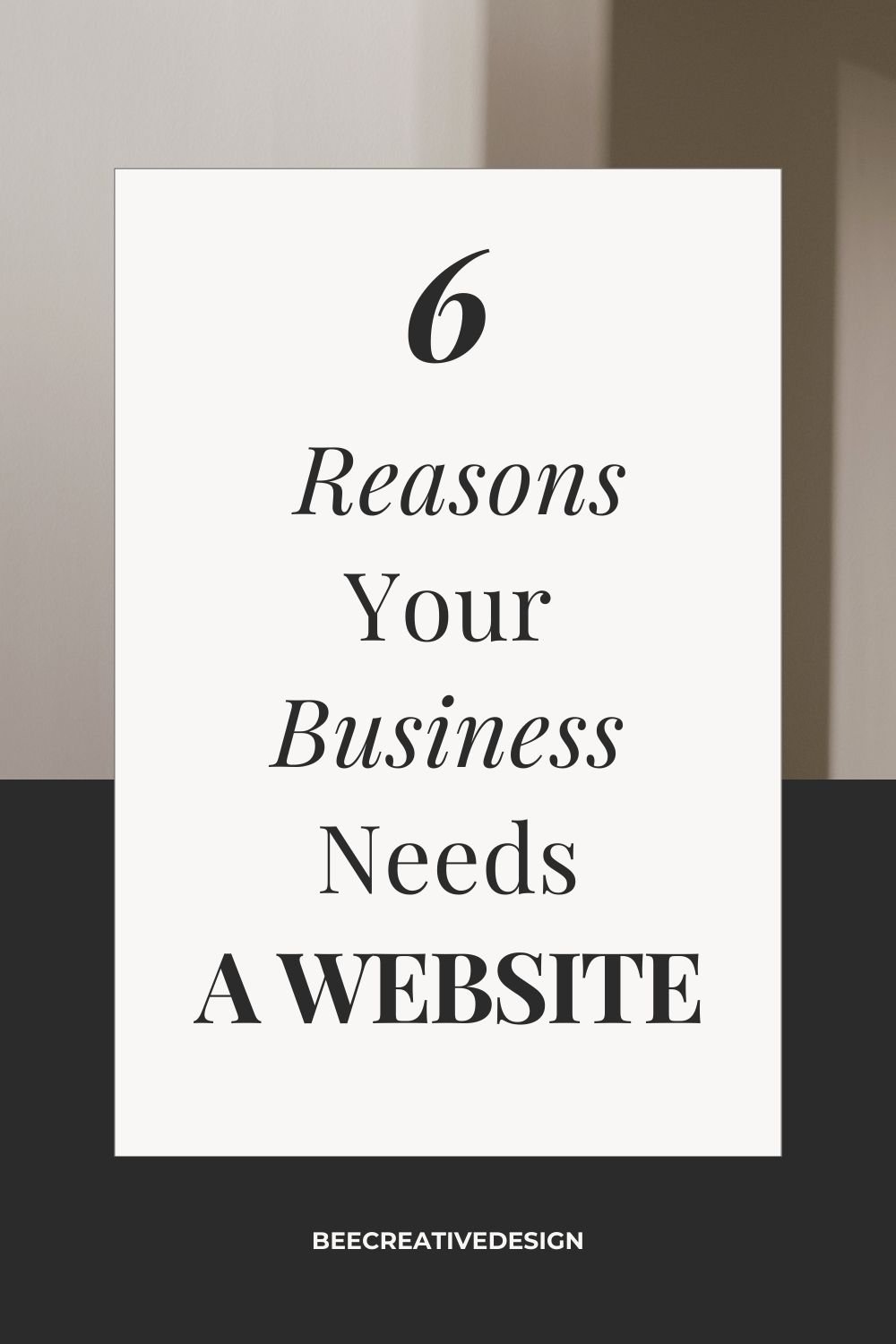6 Reasons Your Business Needs a Website (And How It Helps You Succeed)
Thinking about getting a website for your business? Let me break it down for you—yes, you do! Your website is your go-to spot where people can learn about you, your story, and why they’d want to work with you. It’s actually how people find you and start trusting that you know your stuff.
In this post, I’ll break down the six most compelling reasons your business needs a website, plus actionable insights on how to make yours work for you. By the end, you’ll see why skipping a website isn’t an option if you’re serious about your business.
1. Establish Credibility and Professionalism
How does a website make my business look more professional?
People are Googling your business, and if they don’t find a website, they’re left guessing whether you’re legitimate. Your website is often the first impression customers have of your business, and you want it to be a good one!
A professional, well-designed site instantly tells visitors that you’re a credible business they can trust. It’s a space where you control the narrative about who you are, what you offer, and why you’re the best choice.
Pro Tip: Include customer testimonials, a portfolio, or case studies to reinforce your expertise and build trust with potential clients. Visual proof works wonders.
2. Be Visible and Accessible 24/7
Your business doesn’t stop when you clock out for the day. A website keeps your doors open 24/7, making it easy for customers to find information about your services or products whenever it’s convenient for them.
How do I make my website rank higher on Google?
When your site is optimized for search engines (SEO), it also helps new customers discover you online. Whether someone’s searching for “best vegan bakery near me” at midnight or “budget-friendly interior designers,” your website ensures you’re in the running to grab their attention.
Do I need a mobile-friendly website?
Absolutely! Over half of internet traffic comes from mobile devices. A responsive, mobile-friendly design means customers can access your site on the go, from any device. If your site isn’t mobile-friendly, you’re leaving money on the table.
Pro Tip: Use tools like Google My Business to boost your visibility in local searches and make your contact info easy to find.
3. It’s an Affordable and Powerful Marketing Tool.
Can a website really help with marketing?
Let’s be real, advertising can get expensive fast. A website is a long-term investment that pays off by providing a hub for your marketing efforts. Unlike a billboard or a radio ad, a website is dynamic as you can update it as often as you need without additional costs.
Through tools like blogs, email capture forms, and landing pages, your site helps you connect directly with your audience. It’s also the perfect place to integrate social media and digital ads, driving traffic back to your site where you can convert visitors into customers.
Plus, analytics tools like Google Analytics let you track how people are interacting with your site. Want to know which services are drawing the most interest? Check your metrics. Need to refine your message? Test different landing pages and see what sticks.
Pro Tip: Regularly update your blog with content that answers common questions your audience has. It boosts SEO and positions you as an expert in your field.
4. Engage Customers and Provide Better Support
Customer engagement doesn’t have to be complicated, and your website can make it easier than ever to connect with your audience. Features like live chat, contact forms, and FAQ sections give visitors the information they need without requiring you to be available 24/7.
For example, a coaching business might use their website to host a resource library filled with downloadable guides or an interior design firm could offer a simple questionnaire to streamline the consultation process. These touchpoints don’t just make your life easier but they show your customers you’re thinking ahead about their needs.
Pro Tip: Automate routine tasks like appointment bookings or payment processing through your site. It saves time and gives your customers a seamless experience.
5. Integrate with the Tools You Already Use
What platforms should my website connect to?
Your website ties together all your digital marketing tools and strategies. It works seamlessly with tools you already love like email marketing platforms or CRM, to make everything run smoother.
For example, you can embed sign-up forms to grow your email list or connect your site to a social media scheduler to share blog posts automatically. With tracking tools like Google Analytics, you gain valuable insights into your audience’s behavior, helping you refine your marketing strategies.
Pro Tip: Set up automated email sequences triggered by actions on your website, such as downloading a free resource or signing up for a webinar. Automation keeps your audience engaged without extra effort on your part.
6. Build Your Brand and Stay Competitive
Your brand isn’t just your logo or your tagline. It’s the experience and impression people associate with your business, and your website is the best place to showcase it. With a custom design, consistent messaging, and branded visuals, your site reinforces who you are and why you’re different.
Do I really need a website if my competitors already have one?
If your competitors have websites and you don’t, you’re at a disadvantage. Even if your business is referral-based, customers still expect to verify your legitimacy online. Without a website, you risk losing out to competitors who do.
Pro Tip: Use your site to highlight what makes your business unique, whether it’s your story, your values, or the specific ways you solve your customers’ problems
How to Get Started (or Improve Your Existing Site)
If you’re ready to build a website or give your current one a makeover, here are a few tips to set yourself up for success:
Prioritize User Experience: Your site should be easy to navigate, fast to load, and mobile-friendly. If you’re looking for an effortless way to get started, check out our website template shop for beautifully designed templates that save you time and hassle.
Focus on SEO: Use keywords your audience is searching for and create content that answers their questions.
Make it Actionable: Include clear calls to action (CTAs) like “Book a Consultation” or “Download Our Free Guide.”
Stay Updated: Regularly refresh your content, update your portfolio, and share new blog posts to keep your site relevant.
Conclusion
If you want your business to thrive, having a website isn’t just a nice-to-have but it’s essential! From building credibility to driving marketing efforts and engaging customers, your website is a powerful tool that works for you around the clock. Need a head start? Browse our website template shop to find a design that fits your business vibe perfectly.
Ready to take the next step? Whether you’re starting from scratch or need to revamp your current site, investing in a professional, well-designed website is one of the best decisions you can make for your business’s future.
And if you’re looking for a custom, done-for-you solution, head over to our services and let’s create something amazing together!
FAQs
1. Why does my business need a website if I’m active on social media?
Many business owners wonder if having a website is still necessary when platforms like Instagram and Facebook provide visibility. A website offers control, professionalism, and long-term strategies that social media alone can’t deliver.
2. How much does it cost to create a business website?
The cost of creating a business website depends on several factors, like whether you’re using a DIY platform or hiring a professional designer. On average:
DIY website builders (like Squarespace or Wix): $12–$40 per month for hosting and templates, plus optional add-ons like custom domains or premium features.
Custom-designed websites: $2,000–$10,000 (or more), depending on the complexity, number of pages, and custom features you need.
While DIY is budget-friendly, a professionally designed website can save you time and reflect your brand’s unique personality. Ultimately, the cost is an investment in your business’s online presence.
3. What features should a small business website have?
A small business website should have a clear homepage, an about page to share your story, a services or products page to showcase what you offer, and a contact page with easy ways to reach you. Additional features like customer testimonials, an FAQ section, and SEO-friendly content can make your site even more effective.
4. What’s the best way to drive traffic to my website?
Combine social media promotion, blog content, email campaigns, and paid advertising to drive visitors to your website. Make sure you have engaging, actionable content once they arrive so they’re encouraged to stay and explore.
Welcome to my corner of the web! I’m Pat, a passionate Squarespace website designer dedicated to helping creative entrepreneurs confidently launch their websites and book more clients. My goal is to empower you to create a digital presence that not only captivates your ideal clients but also converts visitors into loyal customers. Whether you're looking to revamp your existing site or start from scratch, I'm here to guide you every step of the way
Just a heads-up: This post may contain affiliate links. That means if you click on one of those shiny links and make a purchase, I might earn a small commission – at no extra cost to you! Think of it as you buying me a coffee ☕for sharing these fantastic finds with you. It helps keep the blog lights on and the content flowing! So, while you’re here, feel free to enjoy the recommendations and know that your support means the world to me.







